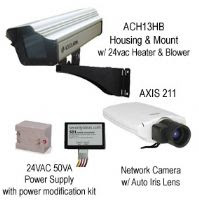
Installing An Outdoor Security Camera
One of the most important considerations for outdoor security cameras is the power source. Quite often, building codes don't require many outdoor, electrical connections, which means that if you require an outdoor security camera you're going to have to deal with that situation. In most cases, there are power sources in the garage that can be utilized for this purpose with a simple bit of concealed wiring. However, if your home or apartment does not have a convenient power source, you may have to create one where you intend the camera equipment to be placed.
Once you've solved the power requirements for your outdoor security cameras, you have to do some research on the best equipment for the geographical area that you live in. The system has to be protected from the weather and that means a different system will function best in Tucson, Arizona where the summer temperatures quite often reach and sometimes exceed 120 degrees Fahrenheit, and another system will be used in Maine where winter weather
can drive temperatures down as low as -20 degrees Fahrenheit.
One system could never function all year around, twenty-four hours a day without being designed especially for the weather.
An additional consideration for outside security cameras is the light source. All cameras require adequate light to properly photograph a subject and video cameras are no exception. This ability to use light is measured as a lux rating. The lower the lux rating of a camera, the less light it needs to deliver a useable image. If you intend to mount your camera in a spot with little or no available light you have to get the lowest lux rated camera you can find that will allow you to see the person in front of the camera.
If this is not possible you have to provide a light source either near or actually on the camera. Finally, if you are not able to provide additional light, you may want to consider infra-red cameras that can deliver a decent enough image in the absence of light..
We strive to provide only quality articles, so if there is a specific topic related to camera that you would like us to cover, please contact us at any time.
And again, thank you to those contributing daily to our sony camera website.



